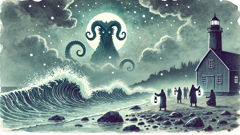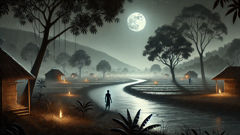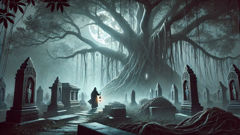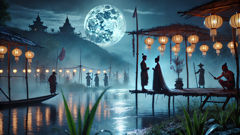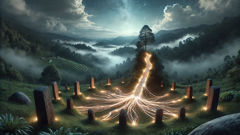Introduction
When the northern winds sweep over the Baltic Sea, rattling the birches and howling through ancient pine forests, tales as old as the granite shores are whispered from one generation to the next. Among these, none chills the bones more than the legend of the Iku-Turso—a monstrous, horned octopus said to dwell in the abyssal depths where sunlight never reaches. Its tentacles, thick as tree trunks, were rumored to writhe through underwater forests of kelp, and its breath could freeze a man’s soul. To the coastal villagers of Finland, the Iku-Turso was more than a myth; it was the living terror that shaped their world, dictating when they fished and where they sailed, a force as real and unpredictable as the sea itself. On moonless nights, fishermen swore they heard its guttural roar echo beneath the waves, and sometimes, boats vanished—never a splinter nor sailcloth found, only swirling eddies left in their wake. The monster haunted the dreams of children and the prayers of elders alike, its legend woven tightly with the mist and salt of the coast. Yet, as with all legends, the story of Iku-Turso is more than a warning; it’s a tale of courage, of the intricate bond between people and nature, and of the sacrifices made when ancient forces are stirred. In the shadow of this myth, one girl’s journey would reveal that fear is not the end of the story, but its beginning.
I. The Night the Sea Screamed
The story truly begins in the fishing hamlet of Kallio, nestled where the forest leaned so far into the sea that the birch roots tasted brine. Life here was measured by tides and seasons, by the cry of gulls and the silver flash of herring nets. For generations, Kallio’s people paid quiet tribute to the waters—casting rye bread and wildflowers into the surf, whispering invocations to appease whatever spirits ruled the deeps. But in the spring of a year long forgotten, something changed. The air hung heavier than usual, thick with the scent of rain and rot, and the gulls grew silent. Fishermen returned with empty nets and haunted eyes, claiming to have seen monstrous shadows gliding below their boats. Then came the night when the sea screamed.
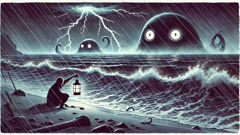
Aino, daughter of Matias the net-maker, was the first to hear it. She woke in her loft to a low, throaty moan that vibrated the rafters and set her teeth on edge. For a heartbeat, she thought it was only the wind playing tricks, but then the sound grew—a wailing roar that rolled over the village, rattling shutters and driving dogs to frantic barking. The old folk gasped and made the sign against evil; children wept, and the bravest men gripped axes and lanterns, peering into the swirling mist. The sea itself seemed to boil in the moonless darkness, frothing at the edge of the shingle. Out beyond the last rock, something vast moved—larger than any whale, with horns like twisted branches breaking the surface, tentacles snaking across the foam.
The next morning, the village gathered at the water’s edge. Where the surf receded, they found the sand gouged with strange marks—deep furrows as if a giant rake had clawed the shore. Among the driftwood lay the shattered hull of Old Jussi’s skiff, but no sign of Jussi himself. The elders met in hushed counsel, their faces grave. There were tales, they said, of a creature older than men or gods, awakened when the balance between sea and shore was broken. Its name was Iku-Turso—the eternal monster. It brought storms and vanished ships, famine and grief.
Aino listened from the shadows, her heart pounding with dread and curiosity. She’d always been drawn to the sea, sneaking down at dawn to watch the waves and collect bits of glass worn smooth by the tide. But now even she hesitated at the shore, feeling the weight of unseen eyes. Each night, the monster’s cries echoed, growing nearer, more insistent. Fishermen refused to cast their nets. Hunger crept into the village. Aino’s father grew gaunt, hands trembling as he mended their last remaining net. Yet, among all this fear, something else stirred within Aino—a stubborn resolve, a need to understand the darkness rather than hide from it.
On the seventh night, when storm clouds blotted out the stars, Aino crept down to the water’s edge. The village slept behind shuttered windows, unaware as she slipped through the grass, her lantern wrapped in a scarf to mute its glow. The sea was glassy and black, reflecting only the streaks of lightning that flickered on the horizon. She knelt among the kelp and driftwood, whispering an apology for trespassing. Then she heard it—a gurgling, guttural growl from beneath the waves, close enough to make the pebbles tremble. Something immense shifted just offshore. Aino froze, caught between terror and awe as two pale, luminous eyes surfaced, staring straight at her from the gloom.
II. Into the Depths
Aino’s breath caught in her throat as those monstrous eyes blinked slowly in the water’s gloom. For a long, shivering moment, she remained motionless, her mind racing through every fragment of myth she’d ever overheard. Was it true that to meet the gaze of Iku-Turso was to lose one’s soul to the abyss? But as she stared into the cold, alien light, something shifted—neither threat nor invitation, but a weighty curiosity, as if the monster itself was waiting for her to act.
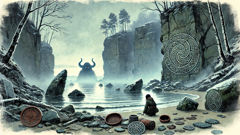
Summoning what courage she could, Aino set her lantern on a flat stone and unwrapped her scarf, letting the wind carry her words: “Great spirit of the sea, why do you haunt us?” Her voice trembled, but she kept her gaze steady. For an instant, the only answer was the thunder and rush of the surf. Then, from beneath, a tentacle thicker than a man’s thigh curled toward her, hesitated, and withdrew. The eyes blinked again, and a series of deep, resonant sounds rolled from the water—neither speech nor song, but something in between. The air shimmered. Images filled Aino’s mind: ancient forests drowned by rising tides; ships shattered on hidden reefs; a great loneliness beneath the waves. The village’s offerings, the balance maintained for centuries, and then—a sharp break, a wound in the harmony between land and sea.
Aino staggered back, heart pounding. She understood now: Iku-Turso was not simply a mindless beast but an ancient guardian, awoken by imbalance. Something had gone wrong, some promise broken. She needed answers. With dawn still hours away, Aino raced back to her cottage, her mind ablaze with questions. She pored over her grandmother’s stories and pestered her father for tales of old. Finally, she found what she sought—a mention of a forbidden cove west of Kallio, where villagers once made yearly offerings. The cove had been abandoned after a storm swept away half its cliff, sealing it behind a wall of fallen stone.
By noon, Aino had convinced her reluctant friend Ilkka to help her reach the cove. They crept past sleeping elders and borrowed a battered rowboat, their journey cloaked in secrecy and growing dread. The air was thick with fog as they rowed around jagged headlands and into the forbidden inlet. The cliffs here rose like fortress walls, pitted with ancient carvings—spirals, waves, and the unmistakable horned visage of Iku-Turso. At the shore’s edge, half-buried in silt, they found the remnants of old offerings: cracked pottery, coins worn smooth by time, scraps of cloth faded to nothing.
Aino knelt beside the largest carving, tracing its lines with her fingers. She whispered apologies for her people’s neglect, promising to restore what had been lost. The sea stirred restlessly beyond the rocks. Suddenly, a low moan echoed between the cliffs, and mist rose in twisting ribbons. Ilkka gripped her arm in panic, urging her to flee. But Aino stood her ground. She emptied her pockets—offering a silver locket, a sprig of heather, and a crust of dark rye—and recited the only blessing she knew. The moaning stopped. The mist thinned. Far out in the water, a massive shadow circled, then slowly slipped beneath the waves, leaving behind an eerie calm.
III. The Pact of Salt and Stone
For days after their secret journey, peace seemed to return to Kallio. The monster’s cries faded, and the sea’s bounty returned in modest measure. Fishermen hauled nets heavy with herring; laughter drifted from the smokehouse; even the gulls found their voices again. Aino hoped that her offering had restored the ancient balance, but she knew the sea’s memory was long and wounds took time to heal.
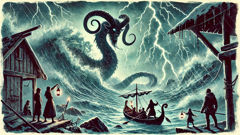
Yet something lingered—a sense of unfinished business, of eyes watching from beneath each wave. That feeling sharpened one night when a fierce storm struck without warning. Lightning split the sky as if tearing open old scars. Aino’s father was caught on the water, his boat tossed like a toy amid crashing swells. The villagers gathered on the beach, shouting prayers into the wind, but Aino could not stand idle. Ignoring Ilkka’s pleas, she plunged into the storm, clutching an oar and a coil of rope.
Waves battered her as she struggled to reach her father’s drifting skiff. The sea roared louder than thunder. Then, just as she reached for his outstretched hand, a massive tentacle erupted from the depths, curling around the boat’s stern. For a heartbeat, Aino stared into the monster’s horned face—its eyes not hateful, but sorrowful. She shouted over the wind: “We remember you! We will not forget again!”
The tentacle loosened. The boat steadied. As if in answer, the storm began to abate. The clouds thinned, revealing a shimmering moon. In that brief, silvered calm, Aino saw Iku-Turso retreating into the deep, its bulk fading like a dream. She pulled her father to safety, both of them collapsing on the shingle as dawn broke over the battered village.
Word spread quickly of Aino’s courage and of the monster’s mercy. The elders summoned her to the meeting hall, demanding answers for her reckless bravery. She spoke plainly—of the broken covenant, of the need to honor old promises if Kallio was to survive. Some scoffed at tales of monsters and spirits, but others saw truth in her eyes. A council was called. Rituals were revived. Offerings returned to the cove each spring and autumn, and stories were passed from hearth to hearth—not only warnings, but reminders that harmony with nature was a pact written in salt and stone.
Conclusion
Years passed, and Aino grew to be Kallio’s lorekeeper—her hair silvered by sea air, her eyes as sharp as ever. The legend of Iku-Turso endured, but so too did the peace that followed her brave confrontation. The monster was no longer merely a shadow to fear but a reminder of respect owed to nature’s ancient forces. Every spring, the villagers gathered in the forbidden cove—now open and lush with wildflowers—to lay their offerings at the carved stones and sing songs of gratitude to the waves. Children played at the shore, unafraid but mindful, their laughter echoing where once there was only dread. Aino would watch them and sometimes tell her story—not as a warning of monsters lurking in darkness, but as a lesson in balance, courage, and listening to what stirs beneath the surface. For as long as tides turn and storms gather over the Baltic, Kallio’s people remember that legends are not just relics of fear—they are bridges between past and present, between human hearts and wild, unknowable seas.

